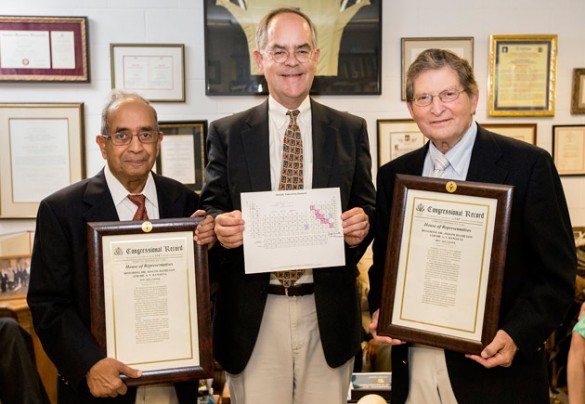
On Friday, Aug. 12, U.S. Rep. Jim Cooper, D-Nashville, accompanied by an entourage of navy blue-jacketed interns, dropped by the Vanderbilt offices of Joseph Hamilton, Landon C. Garland Distinguished Professor of Physics, and Professor of Physics A.V. Ramayya to honor them for their role in the discovery of the new superheavy element 117 that has been provisionally named Tennessine.
“These are the two smartest people in Nashville,” Cooper declared, adding, “I’ve definitely been ‘out-nerded!’”
Cooper gave the two nuclear physicists framed copies of the statement about the discovery that he read into the Congressional Record, and they gave him a signed copy of the newly revised periodic table that includes Tennessine.
The discovery and characterization of the new element was the result of a close collaboration among the Vanderbilt physicists and scientists at Oak Ridge National Laboratory, the Flerov Laboratory for Nuclear Reactions in Russia, the Lawrence Livermore National Laboratory in California and the University of Tennessee in Knoxville. Tennessine is also a symbol of contribution of the Tennessee region to superheavy element research through close collaborations among Oak Ridge National Laboratory, Vanderbilt and UT–Knoxville.
In response to a question from one of the interns, Hamilton said that with a new superheavy production facility being constructed in Russia, it may be possible to produce four additional superheavy elements: 119 to 122. According to current theory, these elements should have lifetimes as long as seconds or minutes. That is much longer than recent artificial superheavies with lifetimes of milliseconds or less.
“If one of these elements has a lifetime of even a second or two, it would provide us with a powerful new energy and neutron source that could have a number of practical applications,” Hamilton said.
Although Hamilton’s career now spans 58 years (he joined the Vanderbilt physics department in 1958) and he has been collaborating with Ramayya since 1975, Hamilton said they have funding for another three years so he intends to be involved in the search for the next group of superheavies and hopes they are found before he finally retires.
Observing the ceremony were Hamilton’s nephew Bill Purcell, the former Nashville mayor who is now in private law practice and an adjunct professor at Vanderbilt; Beth Fortune, vice chancellor for public affairs; and Padma Raghavan, vice provost for research and professor of computer science and computer engineering at Vanderbilt.